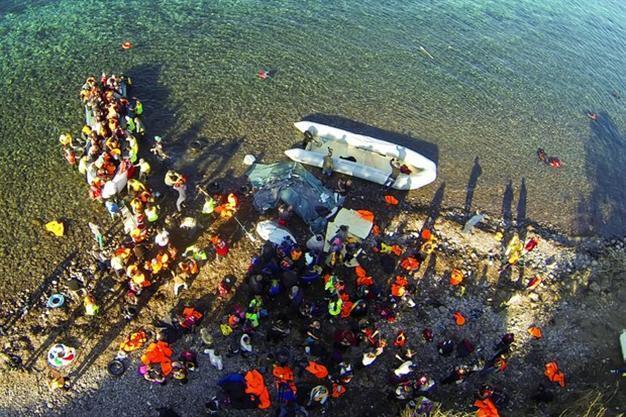UN warns of Lesbos chaos as Mediterranean migrant crossings pass 800,000
GENEVA - Agence France-Presse

AP photo
More than 800,000 migrants and refugees have crossed the Mediterranean to Europe this year, the UN said Nov. 13, warning the Greek island of Lesbos especially was overstretched, with thousands, including young children, forced to sleep outside.Since January, 806,000 people have made the perilous sea journey to Europe, with some 660,700 of them arriving in Greece and 142,400 landing in Italy, new figures from the UN refugee agency showed.
Around 3,460 people have died trying to reach the continent, it said.
While the overall number of arrivals is high, the numbers moving through Lesbos are staggering, UNHCR said, describing a continuing chaotic situation on the Greek island which still has the capacity to accommodate only a fraction of the people pouring in by the thousands.
“With winter approaching, reception conditions and capacity there remain overstretched and inadequate,” spokesman Adrian Edwards told reporters, pointing out that many people, including women, children and even new-born babies were stuck out in the open.
More than half of all those arriving in Greece this year have landed on the island.
Despite colder weather and worsening conditions at sea, an average of 3,300 people arrived each day in November.
Some 16,000 refugees and migrants are currently on the island, which still only has the capacity to accommodate 2,800 people at a time, UNHCR said.
“The numbers arriving on the island are extremely high, and the reception capacity ... is extremely limited,” the agency’s deputy director for Europe, Diane Goodman, told reporters in Geneva by telephone link, describing the situation as “quite critical.”
“Lesbos is the epicentre of the crisis,” she said, pointing out that “while the influx is manageable at the European level, it is really an extreme challenge for an island alone to cope.”
UNHCR is currently the only UN agency on Lesbos, Goodman said, adding that the agency was working to expand its presence on the island and to quickly increase its staffing there from around 30 now to 40.
She urged local authorities to quickly provide the land needed to increase reception capacity to be able to accommodate people properly.
In the meantime, she said UNHCR was “doing what we can in the circumstances,” including helping to identify the most vulnerable people and ensure they receive accommodation.
“We are also distributing blankets, winter clothes, and working with volunteers who are providing some hot meals,” she said.
A full 62 percent of those arriving in Greece are people fleeing the war in Syria, 23 percent come from Afghanistan and seven percent from Iraq, according to the UNHCR numbers.
















